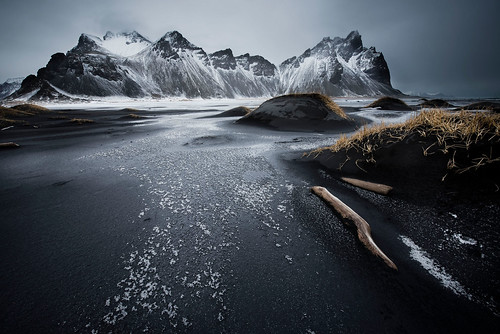The coldest winter winds have teeth. No matter how much down or Gore-Tex you might layer on yourself, an invisible blade slices right through the center of you, pushing a chill into the marrow of your bones. It can be a fleeting thing, a momentary brush against the heart of you by a passing lover with the coldest of fingertips, or a constant howling sensation, a driving force with razor-keen edges that cut through your meat without remorse, leaving you with discomfort bordering on agony.
It’s a hell of a way to remember you’re alive.
Somehow, the tent managed to stay up all night. The sleeping bag kept out most of the cold at bay, but you can still feel the latent bits of cold in your bones from last night’s walking. You tumble out of the protection of the fabric layers and emerge from the tent into harsh, clear sunlight. It’s still cold, colder than anything you’d feel back home, but better now that it’s morning. You get a fire going, set out your little steel pot to heat some water, and sit outside of your tent to look towards your goal.
The jagged peaks of the mountains are partially obscured by low-hanging clouds. The front is moving over the summits like a living, seething mass of gray. It’s odd how something so massive, so ancient, so implacably solid can at once seem closer than it ever has before, and impossibly far away. The mind struggles to process the scale of the mountains in and of themselves, to say nothing of the journey one must undertake to reach said mountains, ascend their heights, and return safely to tell the tale.
You know that last part is going to be the trickiest.
You pour your hot water into the coffee pot and use the rest to saturate some oatmeal. As you chew on your breakfast, you take an inventory of your remaining provisions. The dried fruit and pressed bars of protein make your stomach growl, but you remember that you have a long way to go. The berries and roots that helped keep the edge off of your hunger are behind you, and ahead is a wide expanse of desolation. You don’t know what, if anything, grows on or near the mountains. Mushrooms in caves, perhaps? You close up your bag so you can stop thinking about it. You turn your attention to your breakfast and try to soak up as much sunlight as you can. The clouds give you pause.
Undertaking any sort of journey into the wild or the unknown is fraught with perils and subject to uncertainty and doubt. Those who step outside of their comfort zones, away from civilization, and strive towards something distant or inscrutable aren’t taking a safe trip. Preparations can be made, certainly, and the more informed the traveler is, the better their chance for survival, but complete safety is an illusion. Keeping one’s wits about them is the best safety measure that can be taken, and leads to other measures such as survival gear, maps, rationing, and situational awareness. To head out into the fringes and return safe home is not for the faint of heart or soft of brain.
The wind picks up, a herald of the storm front, and you know it’s time to move on.
You douse your fire, put your coffee in a canteen to be slung at your hip, and scarf the rest of your breakfast. Breaking down the tent takes a mere handful of minutes, but another gust of wind reminds you that time is no longer on your side. If it ever was. In less time than it takes to tell, you’ve shouldered your pack and are once again on your way. Your long staff picks out sturdy places to set your boots, and before long you’ve settled into a familiar, driving pace, teeth set in a defiant grin against the oncoming storm.
When the clouds engulf the sun and the sleet begins to fall, you begin walking widdershins.
Not in tight circles or as part of any sort of ritual. But bearing to your left, slightly away from the direction of the wind, deflecting some of the teeth in those gusts. Nobody ever taught you this was a ‘proper’ way of weathering storms, but it always felt right to you. There are all sorts of stories and superstitions about walking widdershins around churches or graveyards, and a part of you has been quite curious if doing so would ever land you in some truly outlandish situations. But, so far, all it has done is kept you alive and focused through meteorological onslaughts like this one.
You lower your goggles and raise your scarf over your mouth and nose. Through the oncoming freezing rain you still see the mountains. You find your footing, take your step towards them, and bear a bit to the left. You smile behind the woven wool. Widdershins.
The cold drives us. It keeps us alive. It reminds us that it is good that we’re alive.
And when the storms descend on us, and we might lose sight of what we’re heading towards, we have to keep heading towards it anyway, in whatever fashion we can.
Traipse through the wilderness. Walk widdershins. And leave the mediocre, and the past, behind.
The following was prompted by Chuck Wendig over at Terribleminds. The image is Lifeless Beauty by Daniel Bosma.




Leave a Reply